

Inflation Is Coming. Abstract: We evaluate the impact of Coronavirus on the economy and financial markets.
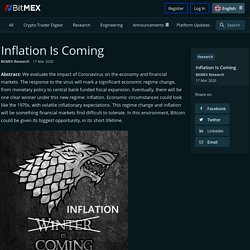
The response to the virus will mark a significant economic regime change, from monetary policy to central bank funded fiscal expansion. Eventually, there will be one clear winner under this new regime: inflation. Economic circumstances could look like the 1970s, with volatile inflationary expectations. This regime change and inflation will be something financial markets find difficult to tolerate. In this environment, Bitcoin could be given its biggest opportunity, in its short lifetime. Is 150 Years of Bank Credit Expansion Nearing Its End? Since the turn of the millennium there have been two global bank credit crises: the first was the deflation of the dot-com bubble in 2001–2, and the second the 2008–9 financial crisis that wiped out Lehman Brothers.
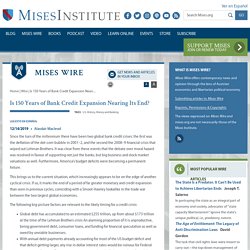
It was clear from these events that the debate over moral hazard was resolved in favour of supporting not just the banks, but big business and stock market valuations as well. Furthermore, America’s budget deficits were becoming a permanent fixture. This brings us to the current situation, which increasingly appears to be on the edge of another cyclical crisis. If so, it marks the end of a period of far greater monetary and credit expansion than seen in previous cycles, coinciding with a Smoot-Hawley lookalike in the trade war between the two largest global economies. The shadow tax of inflation. How Inflation Picks Your Pocket. [ Editor’s Note: This article is adapted from a talk delivered at the Mises Institute’s seminar “Inflation: Causes, Consequences, and Cure.” ] In the denouement of the film There Will Be Blood, the antihero Daniel Planview dramatically reveals to his nemesis that he has secretly siphoned away all of the latter's underground oil.
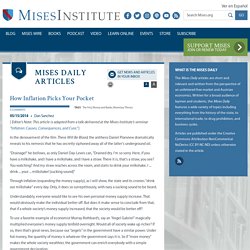
"Drainage! " he bellows, as only Daniel Day-Lewis can, "Drained dry. I'm so sorry. Here, if you have a milkshake, and I have a milkshake, and I have a straw. Through inflation (expanding the money supply), as I will show, the state and its cronies "drink our milkshake" every day. Understandably, everyone would like to see his own personal money supply increase. To use a favorite example of economist Murray Rothbard’s, say an “Angel Gabriel” magically multiplied everyone’s money supply tenfold overnight. Say the government increases the money supply by just having people add zeroes to their bills. But why stop there? Each individual also owns money, I tell them. "It is not #automation that scares people, it is #inflation." So, I've waded through the Evangelical Alliance's new pastoral "guidelines" for interacting with trans people (ughh, the things I do to expose #transphobic#ciswits to the world), and let's just say it's time to tear this particular sh*t-bag a new hole. 1/n Unroll available on Thread Reader So, straight off the bat, first page of text, the use of #language is . . . well, yeah, see for yourself: "It is important to remember that transgender is not simply an issue to be debated;" - p5, #Transformed *sigh* When such language gets reinforced by insisting... 3/n.
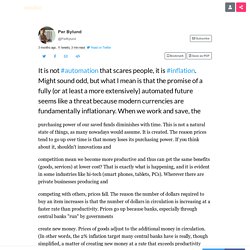
Andrew Yang Fears Automation. He Should Fear Inflation. For a variety of reasons, rich countries are more easily able to cut per capita carbon emissions.
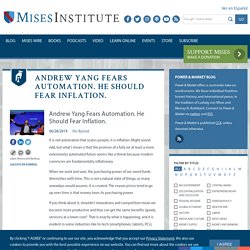
These include both better access to cleaner energy sources and the fact it is more politically feasible to cut emissions in a rich country than in a poor country. In poor and middle-income countries, voters and residents tend to live closer to subsistence levels and the cost of cutting emissions could be the difference between a steady food supply and malnutrition. It could mean a real cut to the availability of reliable medical services. Proportionally speaking, a cut to carbon emissions in a wealthy country will rarely lead to such stark choices.
So, if we want to see where carbon emissions are likely to grow the most — or at least shrink the least — in coming decades we should be looking outside the wealthy West. But Chinese carbon emissions are now double that of the US. As astute readers are likely, to note, however, the US has far fewer people than does China. Inflation. Economic Policy: Thoughts for Today and Tomorrow (1979), transcription of Lecture 4 (1958) If the supply of caviar were as plentiful as the supply of potatoes, the price of caviar — that is, the exchange ratio between caviar and money or caviar and other commodities — would change considerably.
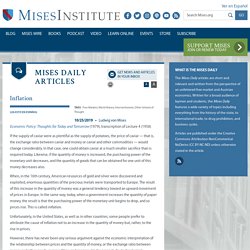
Treasury Inflation-Protected Securities – TIPS Definition. What Is Treasury Inflation-Protected Securities – TIPS?
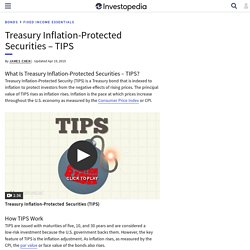
Treasury Inflation-Protected Security (TIPS) is a Treasury bond that is indexed to inflation to protect investors from the negative effects of rising prices. The principal value of TIPS rises as inflation rises. Inflation is the pace at which prices increase throughout the U.S. economy as measured by the Consumer Price Index or CPI. Volume 75% Press shift question mark to access a list of keyboard shortcuts Play/PauseSPACE Increase Volume↑ Decrease Volume↓ Seek Forward→ Hyperinflation.
Interest Rates. New Economic Paradigm.